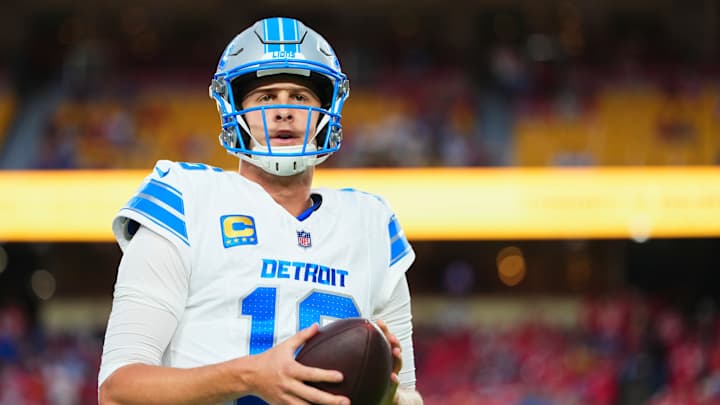The Detroit Lions’ first drive against the Kansas City Chiefs on Sunday Night Football began with promise, but it quickly spiraled into confusion and frustration. A controversial call that nullified a touchdown set the tone for what would become a rough night for the Lions.
Driving down to the Chiefs’ goal line, the Lions relied on their strengths: consistent rushing and precise passing from quarterback Jared Goff. On fourth and goal, the team opted to go for it, unveiling a trick play. Goff motioned out, and the ball was snapped directly to running back David Montgomery, who then threw it to Goff. Despite a bobble, Goff managed to secure the ball and cross into the end zone.
It wasn’t as clean as his TD reception against the Seattle Seahawks last year, during his perfect 18-for-18 game, but it was still an impressive play. Unfortunately, the excitement was short-lived. After an extended discussion, officials ruled Goff’s motion illegal. The touchdown was rescinded, and the Lions settled for a field goal.
The penalty left fans and players debating officiating decisions, with many pointing to perceived favoritism toward the Chiefs, who finished the game without a single accepted penalty. Confusion extended to both Goff and head coach Dan Campbell.
Few were more surprised than Goff himself. After the game, he explained his perspective:
“Yeah, I got to do a little, I guess, we all got to do a little research on what exactly went wrong. My hands were not under center, and I was set to begin the play. As far as I was concerned, I thought that was the only thing I needed to do. (The officials) were saying that, and I never heard this, that because of how close I was to the center, that then declares me as the quarterback, and then I can’t go in motion. I was only under the impression that it was my hands under center. So, that’s a new version of that rule I had never heard of, and I think a lot of our coaches had never heard of. And if that is the rule, then I guess we need to do a little more research on that.”
Debate arose over whether Goff’s position relative to center or his timing in motion was the issue. Both possibilities existed, leaving fans and analysts questioning the fairness of the call, especially after a lengthy discussion.
Adding complexity, the origin of the ruling was unclear. Goff stated he was told the call was based on his proximity to the center. Campbell, however, believed the overturn came from the NFL’s officiating crew in New York. He said:
“I know (the call to overturn) came from New York, and they said (Goff) never stopped. He stayed in motion. He can’t stay in motion.”
New York refers to the replay assistance team at the NFL’s Art McNally GameDay Central. While both explanations could hold elements of truth, miscommunication was evident.
The postgame pool report provided additional insight, yet it raised more questions. Referee Craig Wrolstad explained to reporter Matt Derrick that the play’s legality hinged on whether Goff was properly set after motion:
“Because (Goff) gets out of the view of some of the officials, we had to piece it together as a crew as to whether he stopped initially (at center) and whether he stopped when he went in motion.”
It was ultimately determined that Goff was set at quarterback but not as a receiver. Wrolstad confirmed that had Goff lined up in shotgun, the play would have been legal. Most intriguingly, Wrolstad noted the overturn decision was internal:
“We did not have any assistance from Kansas City or New York.”
This contradicted Campbell’s belief that New York officials were involved. Whether it was miscommunication or procedural ambiguity, the result frustrated players, coaches, and fans alike.
Momentum likely shifted after the overturned touchdown. Coupled with other questionable calls and missed opportunities, the Lions struggled mentally, culminating in a 30-17 loss to the Chiefs. Despite the confusion, Campbell insisted the call didn’t decide the game, but the impact on team morale was undeniable.
